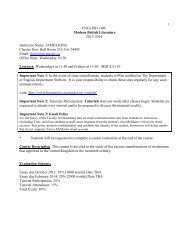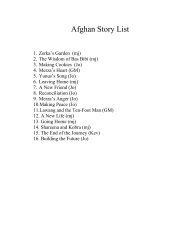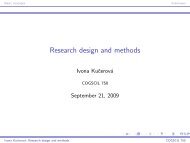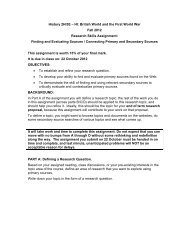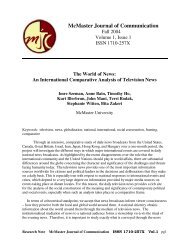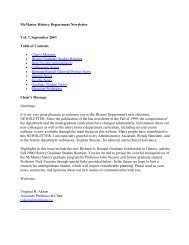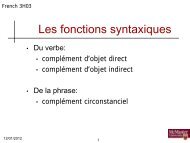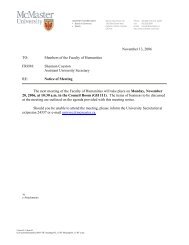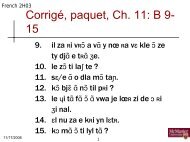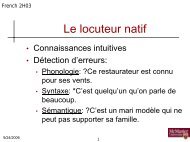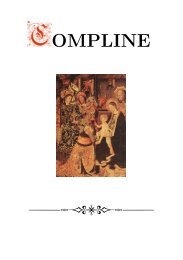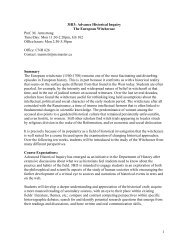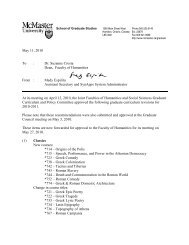Kinesiol 3A03 - Faculty of Humanities - McMaster University
Kinesiol 3A03 - Faculty of Humanities - McMaster University
Kinesiol 3A03 - Faculty of Humanities - McMaster University
Create successful ePaper yourself
Turn your PDF publications into a flip-book with our unique Google optimized e-Paper software.
McMASTER UNIVERSITY<br />
History 3S03 (/<strong>Kinesiol</strong> <strong>3A03</strong>) The History <strong>of</strong> Exercise and Sports Medicine<br />
Fall 2009<br />
Dr. Nancy B. Bouchier<br />
Classes: 12:30-1:20 Tues (lecture), Wed, Friday (tutorial discussion) Office: CNH 603<br />
ph. (905) 525-9140 ext. 24136 bouchier@mcmaster.ca Office Hours: TBA - and by appt (email)<br />
CALENDAR DESCRIPTION<br />
Selected topics in the social and cultural history <strong>of</strong> exercise and sports medicine in the Western<br />
World, with an emphasis on the 19th- and 20th-century developments in North America. Three hours<br />
(lectures and discussion); one term Prerequisite(s): Registration in Level III or above Cross-List(s):<br />
KINESIOL <strong>3A03</strong><br />
COURSE OBJECTIVES AND CONTENT<br />
This course is designed to provide students with an understanding <strong>of</strong> changes in concepts <strong>of</strong><br />
physical exercise over the course <strong>of</strong> western civilization from an emphasis on hygiene to one on training<br />
for high performance in sport. It examines the relationships between exercise, health, fitness, physical<br />
culture, physical training, and sports medicine through lectures, through tutorial discussion <strong>of</strong> assigned<br />
secondary (2°) source readings (the writings <strong>of</strong> sport and medical historians), and through primary (1° )<br />
source writings <strong>of</strong> thinkers and practitioners from various historical periods. In the process, students will<br />
develop and enhance their skills in critical reading, writing, analysis, participating in the peer-review<br />
process throughout the year, and presenting their work in both written and verbal form. Selected topics<br />
in the history <strong>of</strong> exercise and sports medicine from ancient times to the present include: the medical,<br />
sport, and physical culture elements <strong>of</strong> exercise movements; gymnastic systems, diet regimens,<br />
pr<strong>of</strong>essional organizations, and athletic training regimens; and issues such as medical quackery,<br />
pr<strong>of</strong>essional encroachment; and the gender implications <strong>of</strong> exercise and sports medicine theory and<br />
practice.<br />
ACADEMIC INTEGRITY<br />
“You are expected to exhibit honesty and use ethical behaviour in all aspects <strong>of</strong> the learning process.<br />
Academic credentials you earn are rooted in principles <strong>of</strong> honesty and academic integrity. Academic<br />
dishonesty is to knowingly act or fail to act in a way that results or could result in unearned academic<br />
credit or advantage. This behaviour can result in serious consequences, e.g., the grade <strong>of</strong> zero on an<br />
assignment, loss <strong>of</strong> credit with a notation on the transcript (notation reads: “Grade <strong>of</strong> F assigned for<br />
academic dishonesty”), and/or suspension or expulsion from the university.<br />
It is your responsibility to understand what constitutes academic dishonesty. For information on the<br />
various kinds <strong>of</strong> academic dishonesty please refer to the Academic Integrity Policy, located at:<br />
http://www.mcmaster.ca/univsec/policy/AcademicIntegrity.pdf, especially Appendix 3, Academic<br />
Dishonesty Explanations.<br />
The following illustrates only three forms <strong>of</strong> academic dishonesty: Plagiarism, e.g., the submission <strong>of</strong><br />
work that is not one’s own or for which other credit has been obtained; Improper collaboration in group<br />
work; Copying or using unauthorized aids in tests and examinations.”<br />
COURSE FORMAT/INSTRUCTIONAL METHODS<br />
Each week class is held during a three 50 minute time blocks; one each <strong>of</strong> lecture, tutorial, and<br />
related assignments/research/independent coursework (online discussion and postings; weekly topicrelated<br />
www sites, etc.) on the Hist 3S03 E-Learn @ Mac [ELM] site. Tuesday lectures will typically be<br />
presented in Powerpoint format; the mandatory Wednesday and Friday tutorial portion <strong>of</strong> the class<br />
involves group discussion <strong>of</strong> assigned questions and tutorial readings led by student facilitators as well
as and group discussion and peer review <strong>of</strong> student assignments. All assignment instructions will be<br />
available on ELM, with endnote (rather than footnote) and bibliographic citations done according to the<br />
Turabian/Chicago Style. Format examples for this style are available online:<br />
http://library.mcmaster.ca/guides/turabian.htm<br />
All graded work will be returned during normally scheduled class times and students who are not<br />
available to pick up their work should contact the instructor to make arrangements for its return. Each<br />
student will be able to access their grade records as they are determined throughout the term in a<br />
confidential way on the course ELM site. Please bring any discrepancy between the posted grades and<br />
your own records to the attention <strong>of</strong> the instructor so the matter can be attended to expediently.<br />
The reading and discussing <strong>of</strong> assigned readings and attending the mandatory tutorial portion <strong>of</strong><br />
class is required in this course. You will submit weekly synopsis sheets on selected readings during<br />
tutorial class. They will be collected, read, and evaluated each week by the Instructor; this assessment<br />
will inform your tutorial participation grade. Blank synopsis sheets are found in the Courseware Pack in<br />
front <strong>of</strong> the designated articles and marked with a # below. See the Synopsis Sheet Help sheet on the<br />
Hist 3S03 ELM for instructions. You will also be assessed on your contribution to tutorial discussions,<br />
and you will complete a self-assessment at the end <strong>of</strong> each tutorial. Remember, tutorials are mandatory<br />
and an essential part <strong>of</strong> your experience in this course, and a sizable chunk - some 15% - <strong>of</strong> your final<br />
grade comes from tutorial participation and your handing in <strong>of</strong> required tutorial class work.<br />
The instructor and university reserve the right to modify elements <strong>of</strong> the course during the term.<br />
The university may change the dates and deadlines for any or all courses in extreme circumstances. If<br />
either type <strong>of</strong> modification becomes necessary, reasonable notice and communication with the students<br />
will be given with explanation and the opportunity to comment on changes. It is the responsibility <strong>of</strong> the<br />
student to check their <strong>McMaster</strong> email and course websites weekly during the term and to note any<br />
changes.<br />
HIST 3S03 ELM SITE AND MCMASTER EMAIL ACCOUNT POLICY.<br />
This course requires that students use the HIST 3S03 ELM site and its discussion boards for<br />
ongoing class communication; the downloading <strong>of</strong> lecture notes; access to weekly topic-related www<br />
sites; handing out course and assignment information and study questions; and for other things such as<br />
announcements should the lecture schedule be changed in any way. Students must therefore check the<br />
ELM site at least several times a week, and always before all classes.<br />
It is the policy <strong>of</strong> the <strong>Faculty</strong> <strong>of</strong> <strong>Humanities</strong> that all e-mail communication sent from students to<br />
instructors (including TAs), and from students to staff, must originate from the student's own <strong>McMaster</strong><br />
<strong>University</strong> e-mail accounts. This policy protects the confidentiality and confirms the identity <strong>of</strong> the<br />
student. Instructors will delete messages that do not originate from a <strong>McMaster</strong> e-mail account.<br />
To log in at the Hist 3S03 ELM Website, you will need to start your web browser and go to:<br />
https://elm.mcmaster.ca/webapps/portal/frameset.jsp Enter your user name and password. Then click<br />
OK. Instructions for these and other operations such as using the calendar, printing pages, posting to the<br />
discussion area, etc., are found online on the HIST 3S03 ELM site.<br />
REQUIRED COURSE TEXTS/READINGS<br />
- HIST 3S03 Custom courseware pack available through the <strong>McMaster</strong> <strong>University</strong> Bookstore.<br />
- the contents <strong>of</strong> the HIST 3S03 ELM site, including weekly www links and readings available on it<br />
- “Book Reports and Book Reviews” found on the HIST 3S03 ELM site.
COURSE EVALUATION<br />
mid-term examination 20% Week 6 Tues 13 October<br />
assignment #1 20% First version due week 10 tutorial (11, 13 Nov); Final<br />
version due week 11 tutorial (18, 20 Nov.)<br />
assignment #2 15% First version due week 12 tutorial (25, 27 Nov); Final<br />
version due in lecture class 1 Dec.<br />
tutorial participation 15% (including weekly self-evaluations and peer evaluation)<br />
final examination 30% (Scheduled by the Registrar; held during exam period)<br />
Total 100%<br />
Examinations will cover your knowledge and comprehension <strong>of</strong> the subject matter, and your<br />
ability to apply, analyse, synthesize, and evaluate the material. The mid-term examination comes during<br />
the lecture class <strong>of</strong> Week 6 (Tues 13 Oct) and is based upon the subject matter covered until that time.<br />
The final examination will cover the material from Week 7 until the end <strong>of</strong> classes, but will also include<br />
a comprehensive essay-type question that spans the entire year’s work. "A" students will master both<br />
lower-level (knowledge, comprehension, and application) as well as higher-level (analysis, synthesis,<br />
and evaluation) cognitive skills, exhibiting them in written and verbal form, using clear and concise<br />
English.<br />
The two examinations are based upon materials derived from lectures, class discussion, from the<br />
assigned readings, and anything else related to the course. They will consist <strong>of</strong> any <strong>of</strong> the following:<br />
short and long essay-type questions; matching, short answer and fill-in-the-blank-type questions;<br />
multiple-choice type questions; identify and significance essay-type questions; and document reading<br />
and analysis-type questions. Prior to the event the Instructor will give you specific information<br />
concerning the structure <strong>of</strong> the forthcoming exam and examples from past exams so that you may<br />
prepare accordingly. Since you must write well to effectively present your ideas, essay type answers are<br />
graded on content AND writing style. Make sure that it is readable. Omit needless words. Correct<br />
spelling and grammatical errors. Go through your answers until you are satisfied that they are<br />
sufficiently ‘polished’ for submission.<br />
Students will conduct a self-evaluation <strong>of</strong> their tutorial participation that is written on the inside<br />
<strong>of</strong> their name cards every week. The instructor will collect and review these cards every week. As well,<br />
the student facilitators will be assessed by their peers every week.<br />
For assignment and other related instructions see HIST 3S03 ELM . Course assignments must be<br />
handed in during class time on the day that they are due. If you find that you are having acute personal<br />
difficulties (e.g., documented illness, death in the family, any other dramatic event which impedes your<br />
ability to do your work in this class) contact the Instructor as soon as you realize something is wrong<br />
either by phone or email (bouchier@mcmaster.ca) so that alternate arrangements may be worked out. I<br />
have absolutely no problems with helping out students in need <strong>of</strong> special consideration. Please don’t be<br />
afraid to ask for help when you need it. If you are in need <strong>of</strong> administrative help/guidance, students in<br />
the <strong>Faculty</strong> <strong>of</strong> <strong>Humanities</strong> should contact the Advisors in their Dean’s Office CNH 112 ext. 27532<br />
<strong>Humanities</strong>Advisors@mcmaster.ca while students in the <strong>Faculty</strong> <strong>of</strong> Science should contact their<br />
Advisors in BSB 129 ext. 27590 science@mcmaster.ca. Students who are having academic problems<br />
(understanding course content, writing exams, tutorial participation, or researching/writing class<br />
assignments), please speak to me as soon as you feel that you are slipping. We will work together to<br />
identify the problem and find ways in which to fix the situation.
COURSE SCHEDULE - LECTURES, EXAMS AND READINGS<br />
Each week you will be reading both Secondary and Primary Source Readings. You will also be filling<br />
out and handing in a Synopsis Sheet for certain assigned Secondary Source readings. They will be<br />
marked below by a crosshatch (#). Synopsis sheets are always found in front <strong>of</strong> the article and the title <strong>of</strong><br />
the article assigned for synopsis. Primary Source Readings are marked with an asterisk (*) below.<br />
WEEK-BY-WEEK STUDY GUIDE FOR LECTURE, TUTORIAL AND ASSIGNMENTS<br />
Any changes to this study guide and list <strong>of</strong> lecture topics will be posted on the HIST 3S03 ELM<br />
, if changes are needed. Each week you will receive a short list <strong>of</strong> study questions which have been<br />
submitted to the Instructor by each week’s student facilitators (every student is required to take turns<br />
being the facilitator, creating the readings questions and leading the class discussion <strong>of</strong> a particular<br />
reading). These questions will then be made available to you through the HIST 3S03 ELM site for<br />
discussion in the tutorials held on Tuesday and Thursdays. Students should work together in tutorial to<br />
answer the study questions and each student should build a set <strong>of</strong> notes on each question. Typically,<br />
some exam questions will be related in some way to these study questions.<br />
Week 1 11 Sept [Friday]<br />
Intro to HIST 3S03<br />
Students will sign up for Wed or Friday tutorials.<br />
Week 2 15, 16, 18 Sept.<br />
Lecture: Exercise, Sports Medicine, and the Past<br />
Getting to know the Tutorial system and your class colleagues; setting up study groups; and becoming<br />
familiar with the HIST 3S03 ELM site.<br />
Tutorial: No readings are assigned, however we will discuss the Courseware Pack and the following<br />
from it: 1. “Time line <strong>of</strong> Medicine”; 2. Pilkington, “Medicines.”<br />
Week 3 22, 23, 25 Sept.<br />
Lecture: Humoral Theory, Exercise and Medicine in the Ancient World<br />
Tutorial: 1. #Porter, “Antiquity;” 2.*Diagram, “Humoral System;” “Humoral Spirits; “ 3. *Hippocrates,<br />
“A Regimen for Health.”<br />
Week 4 29, 30 Sept., 2 Oct<br />
Lecture: Medieval and Renaissance-era Anatomy and Health Regimens<br />
Tutorial: 1. #Jacalyn Duffin, “The Fabricated Body: History <strong>of</strong> Anatomy;” 2.*Doctor Christobel<br />
Mendez, “On the Great Pr<strong>of</strong>its That Follow Exercise.” (1553); 3.*”The School <strong>of</strong> Salerno.” (Regimen<br />
Sanitatis Salernitatum 15 th c. CE)<br />
Week 5 6, 7, 9 Oct.<br />
Lecture: Enlightenment-Era Physiology, Scientific Systems <strong>of</strong> Exercise<br />
Tutorial: 1. #Jacalyn Duffin, “Interrogating Life: History <strong>of</strong> Physiology;” 2. *H<strong>of</strong>fman, “Of health, life,<br />
proportion, and nature.” (1695); 3. *Pugh, “On the Necessity and Importance <strong>of</strong> Exercise.”(1794)<br />
Week 6 Tues 13 October - Examination #1<br />
No Tutorials this week
Week 7 20, 21, 23 Oct<br />
Lecture: 19 th Century Gymnastics/Exercise Systems<br />
Tutorial: 1. #Carolyn de la Pena, “Dudley Allen Sargent: Health Machines and the Energized Male<br />
Body;” 2. *Posse, “Modifications <strong>of</strong> the Swedish System <strong>of</strong> Gymnastics to Meet American Conditions.”<br />
(1892); 3. *Sargent, “The Conflict between Business and Pr<strong>of</strong>ession.” (1927)<br />
Week 8 27, 28, 30 Oct.<br />
Lecture: Exercise, Sport, and Training Regimens<br />
Tutorial: 1. #Park, “Athletes and their Training in Britain and America, 1800-1914;”<br />
2. *Students are to bring any primary source document on physical training c. 1800-1940 to class; see<br />
HIST 3S03 ELM for further instructions<br />
Week 9 3, 4, 6 Nov.<br />
Lecture: Gender and Exercise Prescription<br />
Tutorial: 1. #Vertinsky, “The Social Construction <strong>of</strong> the Gendered Body: Exercise and the Ex. <strong>of</strong><br />
Power;” 2. *Bell, “A Doctor Answers Some Practical Questions on Menstruation.” (1955); 3. *Galen,<br />
“On The Usefulness <strong>of</strong> the Parts <strong>of</strong> the Body.”(2nd c. CE)<br />
Week 10 10, 11, 13 Nov.<br />
No Tues Lecture<br />
Tutorial: Assignment #1 Peer Review; Assignment #1 - 4 copies <strong>of</strong> Drafts are due at the beginning<br />
<strong>of</strong> tutorial class<br />
Week 11 17, 18, 20 Nov. ** Assignment #1 Final paper Due at the beginning <strong>of</strong> lecture class;<br />
Lecture: Quackery(?): Food and Exercise Faddism<br />
Tutorial: 1. #Green, “Living the Strenuous Life;” 2. * “Diet and Morals;” “Fletcherism.” (1909); 3.<br />
*Ruddick, “Vigorous Manhood;” “Self-Pollution.” (1934).<br />
Week 12 24, 25, 27 Nov.<br />
Lecture: The ‘science’ <strong>of</strong> body types and exercise - a new physiognomy<br />
Assignment #2 Peer Review; Assignment #2 - 4 copies <strong>of</strong> Drafts are due at the beginning <strong>of</strong> tutorial<br />
class<br />
Week 13 1 Dec ** Assignment #2 Final paper Due at the beginning <strong>of</strong> lecture class;<br />
Lecture: Final Overview<br />
Final Examination - date TBA by Registrar’s <strong>of</strong>fice



